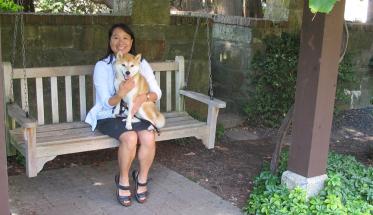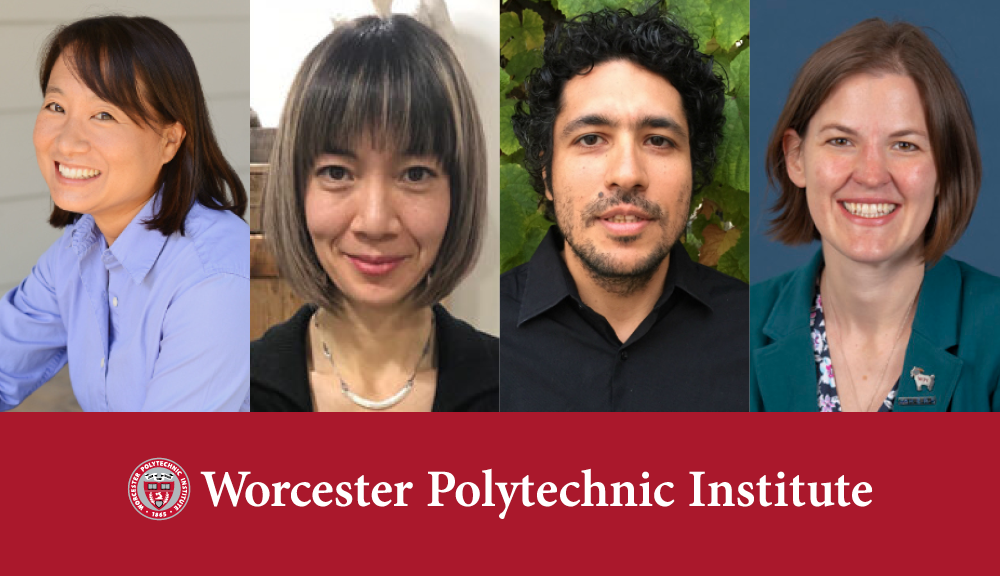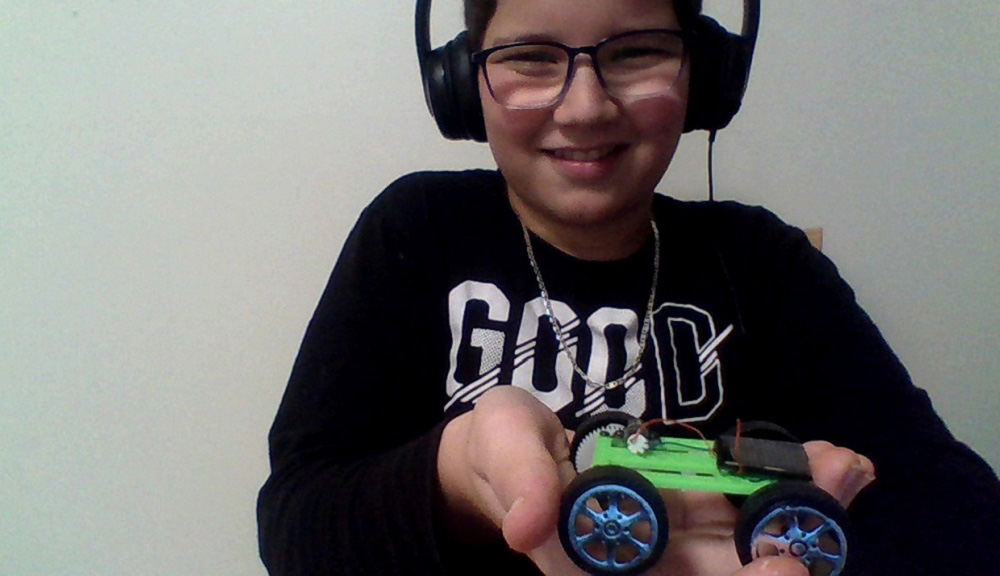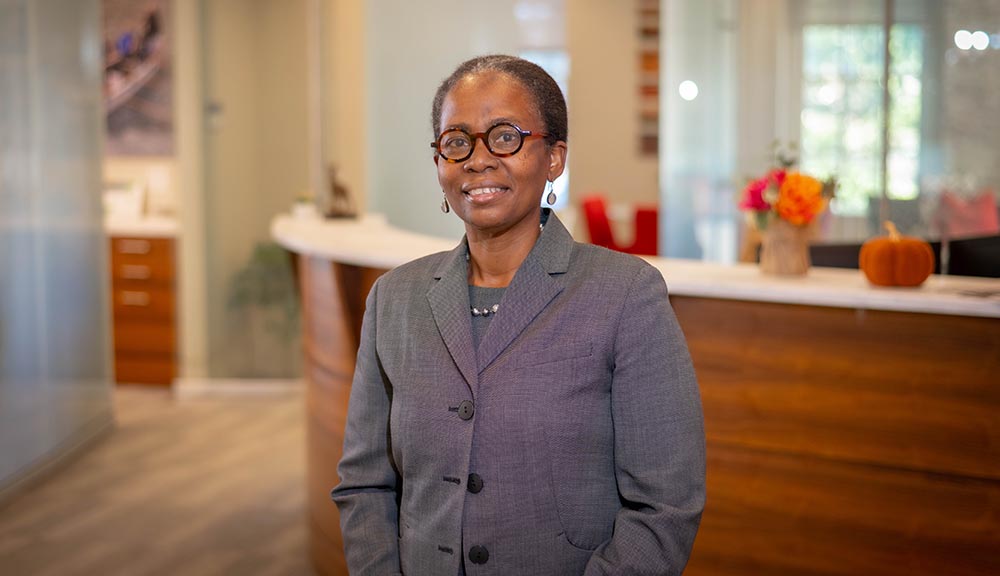Kathy Chen, new executive director of the STEM Education Center, is excited about taking the leap from being a faculty member at a large, public polytechnic university in California for nearly 20 years to heading WPI’s PreK-12 STEM educator hub on campus.
Chen, who received her PhD from MIT, is also excited about her move to New England and seeing her 7-year-old Shiba Inu pooch, Satchi—who comes to work with her almost every day—play in snow for the first time this coming winter.
The STEM Education Center engages with members of the education community around science, technology, engineering, and math, including future and current teachers and administrators. As WPI’s PreK-12 STEM education hub, the Center focuses its work on supporting educators of all kinds, as opposed to directly running programs for youth.
Kathy Chen (left) and Martha Cyr
The Center supports the STEM pipeline through diverse avenues, including professional development opportunities for educators, connecting WPI faculty with PreK-12 teachers, research on teaching and learning, as well as licensure and degree programs.
Chen joins the STEM Education Center after 18 years as a professor in the Materials Engineering Department at California Polytechnic State University in San Luis Obispo, where she also served as department chair for six years. Throughout her time at Cal Poly, Chen was engaged in the K-12 STEM community, facilitating and training engineering college students to do K-12 and public STEM outreach, acting as a liaison for in-service teachers as they integrated engineering content and activities into their classrooms, and co-developing and assessing a summer engineering camp for middle- and high school students.
Chen was also involved in Cal Poly’s Center for Engineering, Science, and Mathematics Education, supporting undergraduates interested in becoming K-12 educators, and co-developing and co-teaching courses with early field experiences in teaching. With degrees from Michigan State University and a PhD from MIT in materials science and engineering, Chen said during a recent interview she is thrilled to begin her role at WPI.
Her first time on the WPI campus was during her job interview, she says. As she learned more about the university and what the Center does, and as she became acquainted with the staff, she says her mind was made up to make the move. She also likes the small community at WPI and says it felt very collaborative and entrepreneurial with people on board with the vision and initiatives she wants to implement.
“I decided to take the leap,” says Chen. “I am passionate about having a positive impact on education in a bigger way. Teaching at the college level, I realized how much is needed at the K-12 level. One way to make a huge impact in K-12 is by working with teachers, supporting in-service educators, and preparing new teachers.”
She believes work at the Center helps broaden who becomes a scientist, engineer, or mathematician.
“By examining the culture and unexamined biases of who does STEM, we can design and investigate how we can make it more inviting for everyone to participate and succeed,” she says. “It will not happen overnight. It is a multipronged effort and we need a lot of people working together on it to see the interconnections and take a more holistic look. There are lots of opportunities and ways to approach improvements in STEM education.”
Teachers play a huge role in changing the “mindset of what STEM is,” and who gets to be a part of it, Chen continues.
“A lot of things are unconscious,” she says. “Just because you are good in mathematics or good in science doesn’t necessarily mean you’ll be an effective engineer. Once you understand problems, you also need to understand solutions in context of society and consider impacts on people and the planet. WPI does a wonderful job of this with their project-based curriculum and we can share this approach with PreK-12 teachers for greater impact.”
“By examining the culture and unexamined biases of who does STEM, we can design and investigate how we can make it more inviting for everyone to participate and succeed.” -Kathy Chen
Children are naturally curious at a young age and are very hands-on in the way they like to learn, she explains, yet, traditionally K-12 education, especially with testing, has been very rigid.
“I think there is a lot of opportunity to expand what K-12 education looks like to develop better learners,” she says. “Also, there is the piece that anybody can do STEM. I think there has been too many preconceived ideas about the image of who is a scientist and engineer. That is very limited, and that can change. We need leaders for that. Teachers play a huge role in shaping that image of who scientists and engineers are.”
Katie Elmes, associate director at the STEM Education Center and director of the Teacher Preparation Program, says the Center, now in its sixth year, is working to engage the broader WPI community in its work.
“The first five years we were getting our feet planted,” Elmes says. “There is a lot of opportunity for growth and Kathy is excited to take the lead.” According to both Chen and Elmes, the Center is eager to expand its partnerships with WPI faculty and the broader local community.
“Current PreK-12 STEM educators work very hard to provide their students with a high-quality education,” she says. “It’s exciting to think about ways new partnerships in our community can continue to couple the passion educators bring to STEM with WPI’s expertise in project-based, integrated STEM research and education.”
Chen follows in the footsteps of Martha Cyr, who stepped aside as executive director of the STEM Education Center after six years to become director of strategic growth for Project Lead The Way—a not-for-profit organization that develops STEM curricula for elementary, middle, and high schools.
Cyr, who has helped educators implement engineering with their PreK-12 learners since 1994, says she will now provide leadership, strategic vision, and planning in her new role for the creation and execution of programs that will produce a leading team of teachers in the state.
“In my new role I will be helping build a network of professional development support for Project Lead The Way teachers in Massachusetts,” Cyr says. “For most of my career I’ve worked to provide systems, materials, and ideas that will help educators excel in the classroom and beyond. Transitioning into this new role allows me to focus my time and energy on the teachers who are part of the Project Lead The Way network here in Massachusetts.”
Cyr adds that she is pleased to have Chen take over as new Executive Director. “With her engineering background, passion for K-12 education, and drive to improve things," she says, "Kathy has all the right aspects to provide the vision that will take the STEM Education Center to the next level.”
- By Paula Owen




